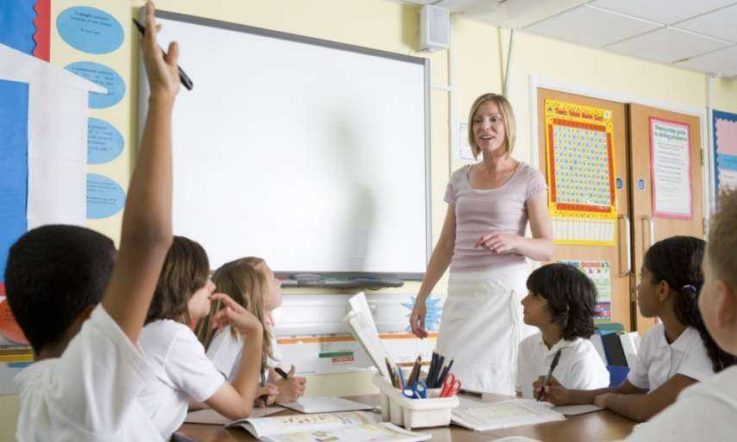Hello, thank you for downloading this podcast from Teacher magazine – I'm Jo Earp and you're listening to Episode 17 of The Research Files. My guest this month is Professor David Lynch from Southern Cross University. The academic led a five year pilot study at a Sydney primary, from 2009 onwards, on creating an outstanding school. Professor Lynch joins me to talk about the team's findings from the pilot and the next phase of the research – replicating the success on a bigger scale.
Jo Earp: When did the study actually start and what was the aim of it?
David Lynch: Well, I had been having discussions with the particular principal of this school way back in 2007/2008 and ... John Hattie then published his book Visible Learning and we were both very interested to read it. As we sort of discussed, we started to look at the key findings from his book and said to ourselves 'Well, could we give it a go? Could we have a look at, for example, what he had published and see if we could replicate this across the whole school?'
... We made a little pact and we said we're not going to get caught up in fads, it's got to be evidence-based, research-driven and we wanted data to inform it. So, we went straight to the literature and we started to do quite a big literature review.
What we found was that, whereas Hattie had published some fairly comprehensive stuff in terms of effect sizes, we found that [with] the education literature there were explosions over the previous decade but most of it was disparate. So, the first task ... was to actually condense all this down to find what we thought might be the sweet spots. In other words, the literature that would give us enough guidance on how to begin.
We put this together in a model and called it the Collaborative Teacher Learning Model because there were basically four things the literature was telling us. First of all we had to have an approach to leadership, we had to think about how we created teaching capacities in the school, how we use data, and then basically some sort of way that we professionally develop teachers. For the first two years, it really was us trying to perfect this [model].
Basically, we said that the outstanding school is one that can achieve defined learning outcomes in every student, sustainably. So, that's what we set about doing. We used Hattie's .4 effect size to basically give us some guidance as to how well we were progressing in this project.
JE: And so you focused on just one school in the pilot study, which was a primary school in Coffs Harbor, which is in Sydney. Now, you mentioned there the first step was determining what an outstanding school looked like - which you've discussed. But, just to be clear, the study was just about one curriculum area wasn't it; you weren't expecting the school to do this in every single area?
DL: No, and as I said it's a pilot study. What that basically means is you test some propositions. ... What the literature was saying to us was if we wanted to remediate the curriculum or the level of learning in the school, having sound literacy skills (i.e. the English curriculum) would be a good place to start. So that's why we focused on that area. I think it's also important - this was a whole of school project ...
JE: Now, after five years of hard work there from the staff and the students it achieved what you'd determined an 'outstanding' school, in that area. And if people want to read more about how that happened, they can go to the various publications. From there, the team concluded that there are four key elements that are crucial to creating and, importantly, sustaining this outstanding school. Can you just take us through those elements?
DL: Okay, four things. The first one is the school leader - the Principal. To make this fly in the school (and we observed this principal over five years) this person really had to first of all know the literature as well. He was PhD trained, which made our life pretty easy because he knew the educational literature and the processes around research as well as what we did.
But you have to look at the personal leadership capacities. He really was determined, he certainly was there for the long haul and he was able to have those tough conversations.
It's interesting when we think about the principalship. We examined teacher attitudes towards the leader across the five years. In the pre-study he was getting [around an 80 per cent satisfaction rating]; by the time we'd got to about half way through the study it had pretty much got to around 60 per cent unsatisfied and 40 per cent satisfied. This is a really interesting phenomenon because as the school was improving if you like, the satisfaction with the Principal was diminishing.
We concluded from this basically that the Principal was having a lot of tough decisions he had to make. He was very much challenging what we would call 'the mythology' of teaching in the school - in other words, when teachers were doing certain things and the data was not supporting it, nor was the research evidence, he had to go along and say 'we no longer do that in our school'. And we assume that essentially that had an impact on that.
But the key point is having a leader to be able to lead these projects is fundamental. Once we had affirmed we had a leader and he was able to sell the vision for where we were going and get teacher buy-in, the next thing was about capacity.
We found that team-based arrangements in the school where, for example, all the Year 4 teachers all planned together, they interrogated the data on each individual student and then decided within their team who would actually deal with a particular student and in what way ... so, distributed leadership and teaming we found was a great capacity way of actually enabling the individual student agenda.
But, you have to in these sort of projects ... you can't rely on rhetoric, what people are thinking; so, having a data environment [the third key element] provided that context. One, it enabled us to get a quantifiable mechanism ... and using Hattie's .4 effect size, was a way of us working out what effect we were having.
But the other side of the coin too is that when you're operating in a data environment, it does create conversation pieces; it challenges the current orthodoxy in terms of how teachers were teaching. It provides a quantifiable way, if you like, of actually coming to terms with what's happening in the classroom.
And the last one was coaching, mentoring and feedback. In the first two years of the project, and this is a real finding I think, teachers were involved in a variety of professional development sessions. Some onsite and some outside, in the traditional way we would get varied experts in literacy to come in and talk to them. We found that in the two years there was no change in outcomes.
We then went back to the literature – and we've published a number of articles about it - where we looked at the premise of introducing coaching, mentoring and feedback. We used the team environment (the teachers were already operating in teams) and identified the teacher in each team who was expert; the teacher who showed that capacity to achieve what we wanted and said to them (in that coaching, mentoring, feedback) 'start entering classrooms, having a look at what's happening and coach and mentor.' As soon as we started that we started to see the results increase ...
JE: We've mentioned a couple of times that this was just a pilot study. I'm guessing the next step, which you're already on with actually, is trying to scale that up. Just briefly then, what will be happening now?
DL: Well, what we've done in our first phase of scale up is we have 12 schools. We have a couple of international schools, schools based overseas, and some local Australian schools – each one with a particular profile. So, what we aim to see now is to see if we can replicate the results, but importantly now there are (because you've got to remember it's a pilot study) a lot of unknowns.
We now know ... that the sweet spots, for example coaching, mentoring, [and] feedback requires more examination. So in the scale up we're actually taking a greater look at what actual teachers are doing when we talk about coaching, mentoring and feedback.
I think the important message is that it's not piecemeal. If you're going to go along and change a school it's not just about 'give it a go in this particular area'. It's whole of school reform, it's all teachers and it's very much about improving teaching.
That's about pedagogical improvement, but it's also about creating the new capacities that fundamentally this type of environment requires, which is leadership, teaming and utilising data.
JE: Well, we'll be interested to see the results of those further studies and hopefully we'll get a chance to speak to you again in the future. But, for now, Professor David Lynch, thank you very much for sharing your work with The Research Files.
DL: My pleasure.
You've been listening to an episode of The Research Files, from Teacher magazine. To download all of our podcasts for free, visit acer.ac/teacheritunes or www.soundcloud.com/teacher-acer. To find out more about the research discussed in this podcast, and to access the latest articles, videos and infographics visit www.teachermagazine.com.au
Research links and further reading
Lynch, D., Madden, J. & Doe, T., (2015). Creating the Outstanding School. Oxford Global Press: London.
Lynch, D., & Madden, J., (2015). Coaching, Mentoring and Feedback: The ‘how to' in a schooling context. Education Alternatives: Journal of International Scientific Publications. Volume 13. August. Pp.116-129.
Lynch, D., (2014). Improving Teaching through Coaching, Mentoring and Feedback: A review of literature. Journal of Educational Studies, Trends and Practices. Vol. 4, no.2, pp. 136-166.
Lynch, D. & Madden, J., (2014). Enabling Teachers to Better Teach Through Engaging With Research. International Journal for Cross-Disciplinary Subjects in Education (IJCDSE), Special Issue Volume 5, Issue 4, December, 2014. pp. 1790-1797. ISSN 2042 6364
Lynch, D., Madden, J. & Knight, B., (2014). Harnessing Professional Dialogue, Collaboration and Content in Context: An exploration of a new model for teacher professional Learning. International Journal of Innovation, Creativity and Change. Vol. 1, Issue. 3, May.
Lynch, D. & Smith, R. (2013). Is It Teaching or Just Another Broadcast Channel that Students are Trying to Tune into? International Journal of Innovation, Creativity and Change. Vol.1, Issue. 2, November.
Does data act as a conversation starter for teachers at your school?



